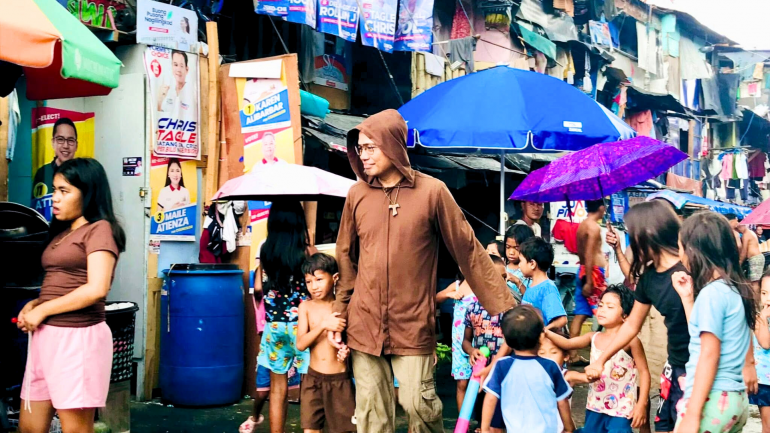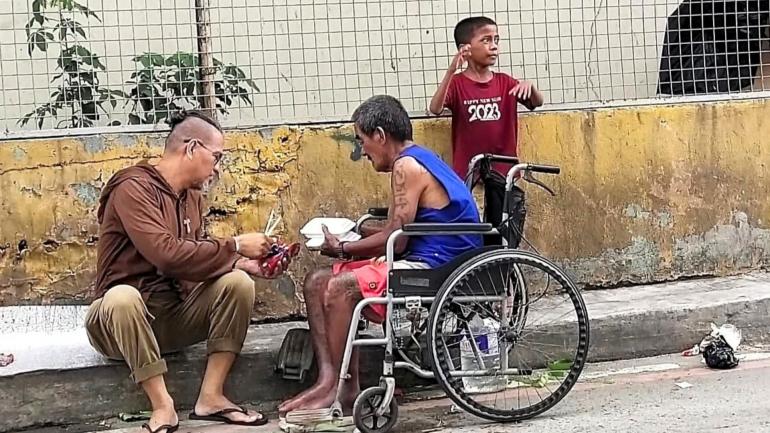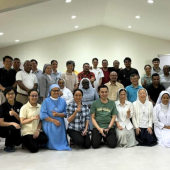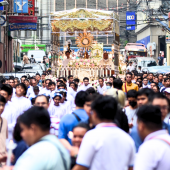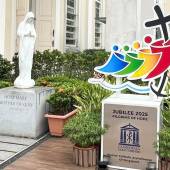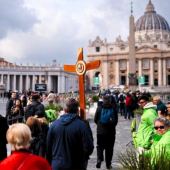Reformed tough guy turns Franciscan, leads street children in Manila back to the Church
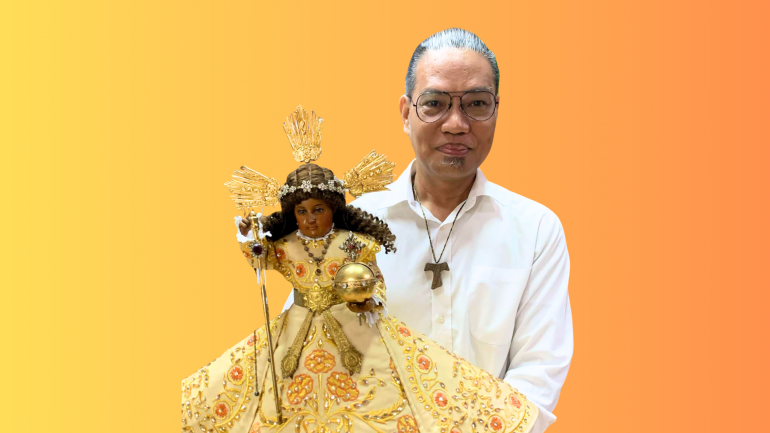
Artemio B. Manuben, a Filipino member of the Third Order of St. Francis (OFS), walks daily through cramped villages in Manila, past topless, tattooed, and tough-looking men smoking on the streets. Clad in the brown habit of the Franciscans, he pushes a cart filled with a Bible, candies, and food to teach catechism to young people involved in drugs, pickpocketing, snatching, and other crimes.
He recalled a time when someone slammed his cart with their palm to send a message that he was not welcome.
But Artemio, 50, with a hairstyle reminiscent of Viking warriors of the Middle Ages, is no stranger to hostility—nor is he shaken by it. He once inspired fear in others before his conversion. In his youth, he was part of a punk group and a fraternity. He stabbed a man who had held up passengers in a jeepney with a balisong (butterfly knife), leaving his hands bloodied.
“I was a bad person when I was young,” he admitted. “I was a drug addict. I hung out with my fellow punks in Recto. We extorted money from students on the street. We smoked marijuana.”
Recto is a well-known avenue in Manila, the capital of the Philippines.
Police chased Artemio while he was high on drugs. The cold-blooded environment around him shaped who he became before finding faith.
His conversion began when a mob of angry fraternity members in black shirts gathered at the gate of his college to settle a score. He stayed inside the campus for hours, hoping they would leave—but they didn’t.
“I thought I would die that day,” he said. “That was the moment I talked to God. I said, ‘If You are God, let me leave this school alive, and I will serve You.’”
Most students had already left. Artemio stayed behind and wept as he prayed.
“There was this classmate I always bullied,” he said. “He worked for a company and drove a car to school. He always left early—but that day, he stayed late.”
Artemio got into the car and hid under the backseat so he wouldn’t be seen at the gate. The angry mob had no idea the car rolling out carried him to safety.
“As the car gained distance, I rose from the floor and looked back at them,” he said. “There were so many of them. I got off in a safe area, believing God had saved me.”
“God sent a vehicle so I could leave safely,” he said. “He revealed to me that He is real.”
From then on, Artemio, a baptized Catholic, retraced his path back to the Church. He began attending Mass, joined the choir, and met religious and laypeople dedicated to the mission of the Church.
But his conversion wasn’t easy—he lived in a community notorious for criminal activity and drug use.
“Street fights were common,” he said. “House fires were frequent. Criminals roamed freely.”
Growing up amid violence and receiving death threats himself, he carried a rosary in one pocket and a balisong in the other.
Around 19, someone roughly pushed him during a jeepney robbery. He instinctively pulled out his knife.
“I surrendered to the police,” he said. “I waited for years for someone to take me to court for that, but to this day, no one has.”
That incident made him turn away from violence and seek God more deeply.
His faith was further deepened after a gang war when someone aimed an Uzi submachine gun at him.
“There was a miracle,” he said. “An armed man pointed a gun at me near a school, but I felt something sweep me inside to safety.”
At 22, he volunteered as a catechist and went to San Carlos Seminary to study formally.
He first came into contact with the OFS in 2008 and eventually joined. He invited his wife to join the OFS as well. In 2012, they both professed their vows. They continue to do street catechism for children.
He met his wife, Liza, at San Carlos Seminary in Makati, where they studied catechesis for two years.
“When I was at San Carlos, I dreamed of marrying a fellow catechist,” he said.
Liza had wanted to become a nun when she was young. A native of Capiz in the central Philippines, she searched for convents when she came to Manila and headed to Tagaytay. But unfamiliar with the area, she and her sibling missed the city and ended up in Lemery, Batangas.
Eventually, she met a nun at a retreat house who told her she was too young to join and advised her to finish college first.
Artemio studied technical electricity at Eulogio "Amang" Rodriguez Institute of Science and Technology in Manila, graduating in 1994.
Together with his wife, he now walks the streets carrying an image of Mary, pushing a cart filled with food and faith for the children. Years of ministry have kept many young people from slipping into darkness.
They also host youth formation at their home in Binodo and visit prisons to teach inmates.
Today, the same streets that once witnessed violence now echo with the greetings of children whom Artemio blesses in return. While crime and danger still lurk, much has changed, thanks in part to his years of street catechism.
Being a catechist and living the example of saints is no easy path in a neighborhood ruled by tough, tattooed men. But his Viking-style haircut seems to create a bridge between their world and the faith he hopes to plant in them, reminding them, and himself, of the saints who once converted the barbarian tribes of old.
Radio Veritas Asia (RVA), a media platform of the Catholic Church, aims to share Christ. RVA started in 1969 as a continental Catholic radio station to serve Asian countries in their respective local language, thus earning the tag “the Voice of Asian Christianity.” Responding to the emerging context, RVA embraced media platforms to connect with the global Asian audience via its 21 language websites and various social media platforms.





